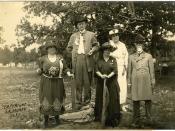This essay will discuss the validity of reasoning behind a 'veil of ignorance' when considering principles of justice. To reach a satisfactory conclusion requires questioning its applicability to society and if it is beneficial using this reasoning. The first step is to define Rawls' ideal and why he thinks it a valid theory. The essay will then consider the problems with using the veil to create a just society . It will finish with a conclusion on the strength of using this theory in reality.
Offering his theory as an alternative to utilitarianism, the fundamental basis of Rawls' philosophy centred on the principle of autonomy and freedom of the individual. He believed that 'each person possesses an inviolability founded on justice that even the welfare of society as a whole cannot override.' Rawls follows the thought concept of rational and equal individuals coming together to format a hypothetical contract, a set of principles defining all associations between individuals.
The principles of justice would then be used to regulate all basic institutions which govern society. Rawls believed that these principles of justice equating with fairness would 'determine â¦the proper distribution of the benefits and burdens of social cooperation'. (Rawls, 1971) In order to create a situation where rational and free people are able to make a rational decision under just conditions, Rawls introduces the 'The Original Position.' He describes the original position as 'a hypothetical status quo in which fundamental agreements would be fair.' (Rawls, 1971) Furthermore, Rawls places all individuals behind a 'Veil of Ignorance.' While all deciding parties establishing the guidelines to justice have an equal voice and are able to choose freely, all must approach the task with no knowledge of themselves regarding any self characteristic such as gender, race etc. or a conception of what good is. As Mullah and3Swift put it, 'in denying people in the original position knowledge of their beliefsabout what makes a life worthy or valuable and attributing to them rather a 'highest order interest' of this kind, Rawls is modelling the substantive moral claim that, when thinking about justice, which matters is people's freedom to make their own choices and to change their minds, not whatever it is that they choose.' (Mullah & Swift, 1992) Additionally Rawls suggests that it is only through the veil of ignorance that rational just principles may be chosen. He saw that if 'one excludes the knowledge of contingencies that set men at odds and allows them to be guided by their prejudices' there would be little discord since 'it should be impossible to tailor principles to circumstances of ones' own case.' (Rawls, 1971) Moreover, Rawls argued that as each individual would put their own interest at heart, grossly unjust principles would not be created. For instance, without knowledge of ones' own status in society, slavery would not be permissible as each party would not want to take the chance of having to occupy that position in society.
It seems true that reasoning behind this 'veil of ignorance' would ensure equality between parties and impede individuals from seeking advantages on those morally irrelevant grounds. However there is a question over why each individuals' knowledge of their particular conception of good is morally irrelevant. Nagel argues that even if each individuals' principles is influenced by their conception of good, they would not be seeking special advantages for themselves so long as he does not know who in the society he is. He perpetuates that the complete impartiality advocated by Rawls does not ensure justice for it overlooks 'the natural position that even in a nonteleological theory what is just must depend on what is considered4good.' (Nagel, 1994) Nagel suggests that in Rawls' ambition to achieve unanimity he overlooks the issue that many conceptions of the good do not fit into theindividualistic pattern. Individuals may be unwittingly committing themselves to principles that may go against their own personal convictions. It may be seen that by excluding all these characteristics, Rawls is not allowing the people to really come together fairly to decide on a set of principles to govern society. Young is an avid instigator of this ideal and argues against Rawls' principle of impartiality being central to justice, in particular that 'the ideal of impartiality in moral theory expresses a logic of identity that seeks to reduce differences to unity.'(Young, 1990)Young argues that this 'veil of ignorance' ideal is a fictional ideal and furthermore, hinders the achievement of true justice.
Young suggests it is impossible to separate the 'embodied self' from the 'thin self' as 'feelings, desires and commitments do not cease to exist and motivate people just because they have been excluded from the definition of moral reason. They lurk as inarticulate shadows, belying the claim to comprehensiveness of universalist reason.' (Young, 1990) She suggests that while the aim of the veil of ignorance is to reduce the differences in individuals by stripping them from characteristics not related to justice which bias their judgments, effectively ruling out any difference among participants in the original position. but also any discussion among them. What is expelled from this 'impartial position' is projected onto particular subjects, who are not part of the different experience and become the absolute other. Additionally, while the constraints on reasoning Rawls builds into this original position it does not allow the true representation of each individual. 'it turns5the merely different into the absolutely other.' (Young, 1990) It creates dichotomy instead of unity. She concludes 'the ideal of impartiality is an idealist fiction. It is impossible to adopt an un-situated moral point of view, and if a point of view issituated, then it cannot be universal, it cannot stand apart from and understand all points of view.' (Young, 1990) A society which adheres to the principle of equal relations in decision making has to allow for a public recognition of people's different identities.
A point which the 'veil of ignorance' brings out is that we can accept utilitarianism as a public conception of justice only if we are prepared to let someone be subject to conditions we would not be prepared to subject ourselves. However, it is not the responsibility of my actions to ensure the fulfilment of another persons goals. These principles create an equal distribution of the 'pie', if you will, yet it is not attainable unless pursued or strived for. There is no room for idle observation, meaning, that while we all possess equal opportunity as we all are equally moral persons, the choice of what you wish to possess materially as well as intellectually is the discretion and capability of the individual. Primarily, these principles promote equality among all. Each individual has the same basic liberties and opportunities. Each individual has a moral obligation to accept the existence of every other human being. In doing so, all people become equal in their position and desires. We are equal in that each has the basic powers of choice and on acting on a sense of justice. The responsibility of procedure and growth relies on each and every individual his/her self. By doing so we may create a level playing field. Seems like a form of pure competition. Competition in that what is desired must be achieved by one and desired6by many perhaps. A benefit of competitive circumstance is the betterment of all parties involved as they must evolve in order to surpass one another .
With the 'veil of ignorance' we exempt our responsibility for caring for that of which we do not know. If we don't see something physically everyday should itbe or not be a concern or an aspect of our own life? If this were so, it could be possible that some things could be ignored by all. The word ignorance scares me since I am ignorant of many things yet in growth I hope to become less ignorant through education. Is it only then that I understand certain circumstances yet since I am not affected personally than I should continue to ignore. This, it would seem, would then rely on my moral truth or obligation, yet I will be the one to ultimately decide, this being the responsibility of all. Can we place that much faith in the moral responsibility of human kind. It sounds great theoretically yet in practice it almost appears that this would create more alienation than is present today. Rawls' basic idea is that if humans were perfect, then this is how they could create a perfect society. An ethical theory based on an "if" is useless if the "if" is not true. Rawls' ideas can be considered irrelevant to the world we live in because humans are not perfect. There is the possibility that we would become the exact opposite of what is desired, a selfish and careless society. There must be caution in placing so much responsibility on moral obligation through this veil.
ReferencesRawls, J. (1971), A Theory of Justice. Harvard University Press: Cambridge, MACorlett, J. A. (1991). Equality and Liberty, Analyzing Rawls. Macmillan Academic & Professional Ltd.: Hong KongNagel,T. (1994). Other Minds, Critical Essays 1969-1994. Oxford University Press: New YorkMullah, S. & Swift, A. (1992). Liberals and Communitarians. Blackwell: Oxford.
Young, M. I. (1990). Justice and the Politics of Difference. Princeton: Princeton University Press.





